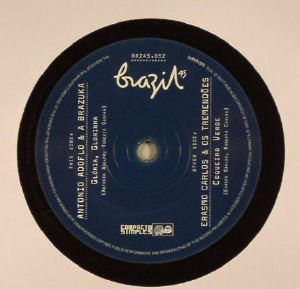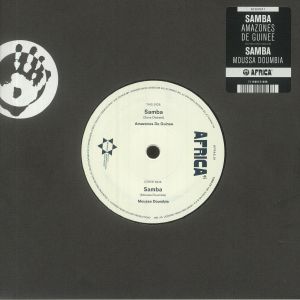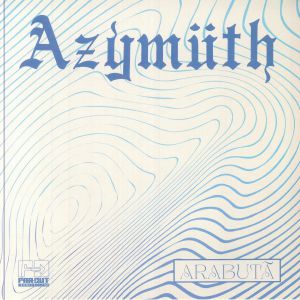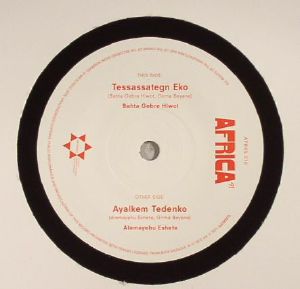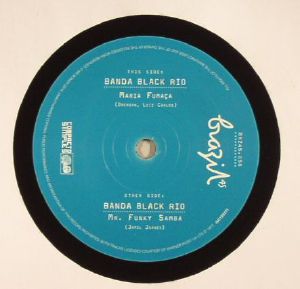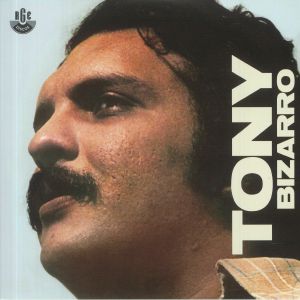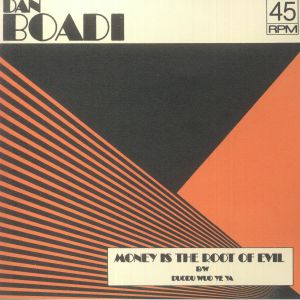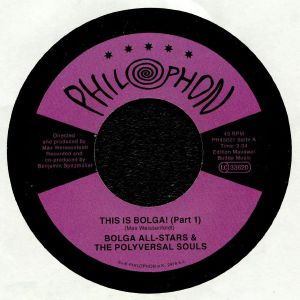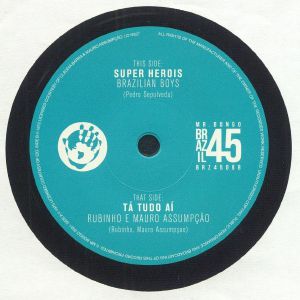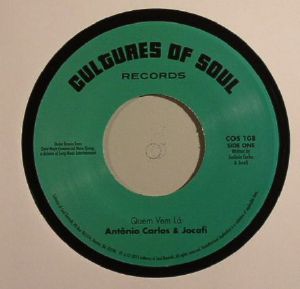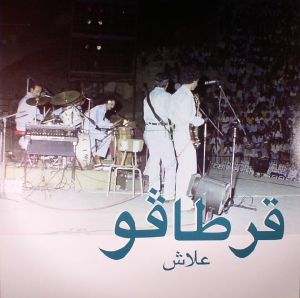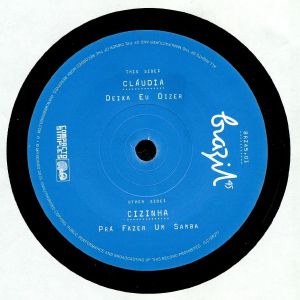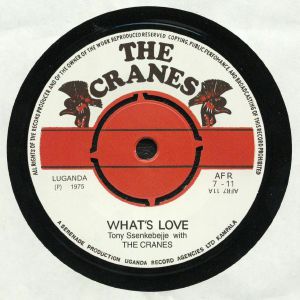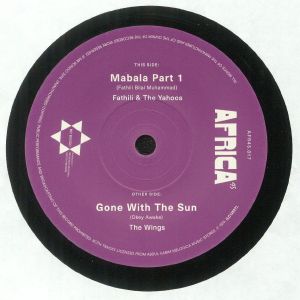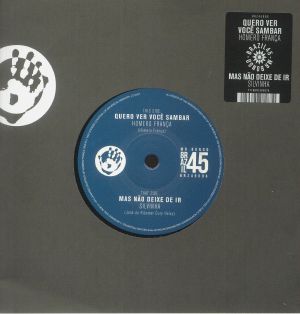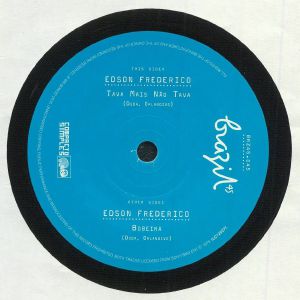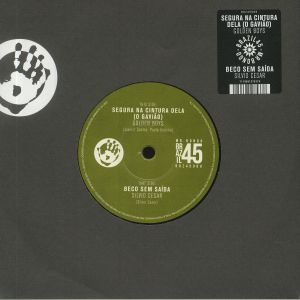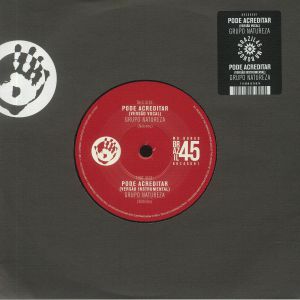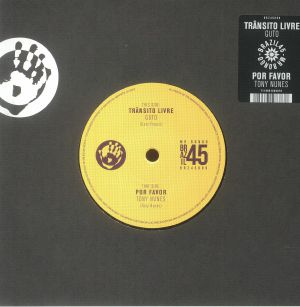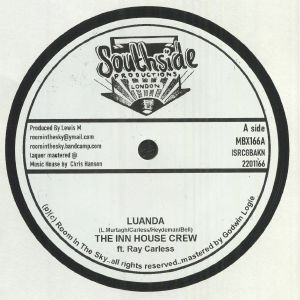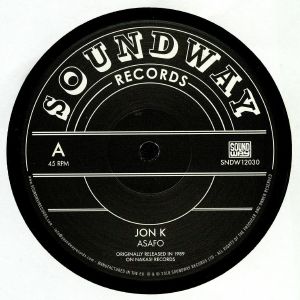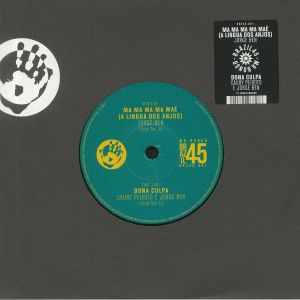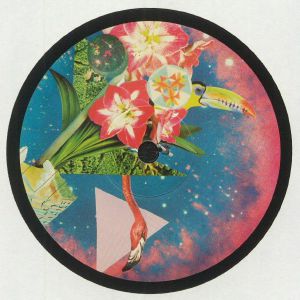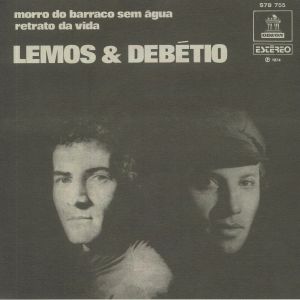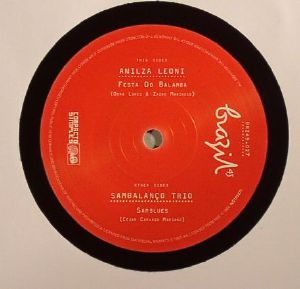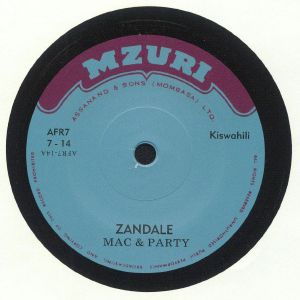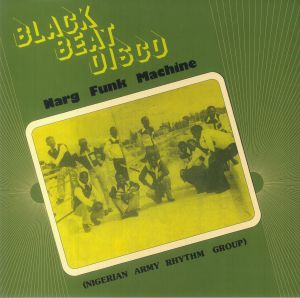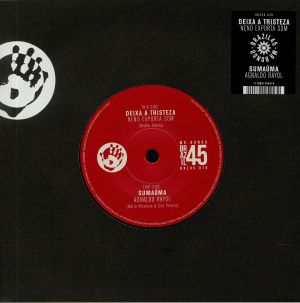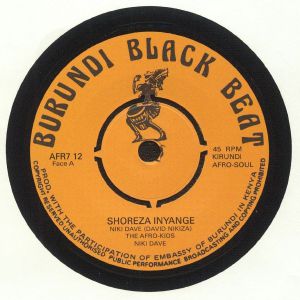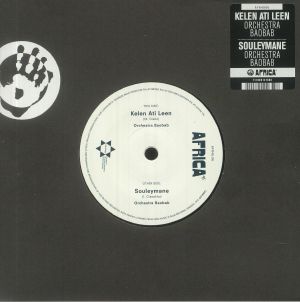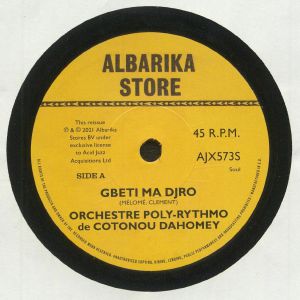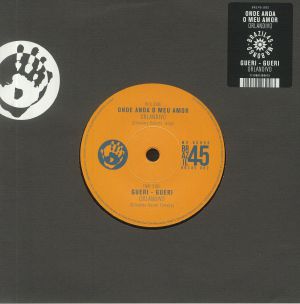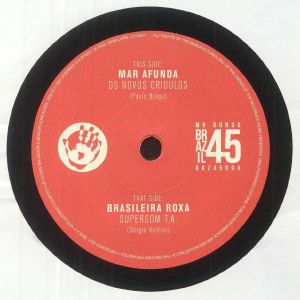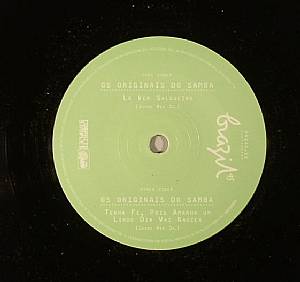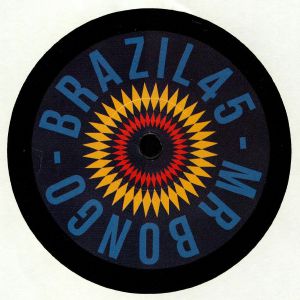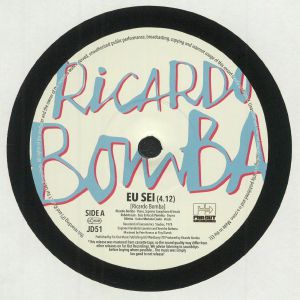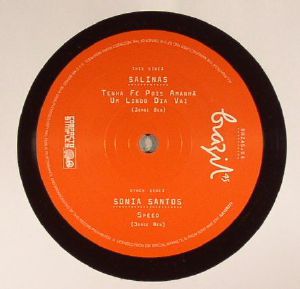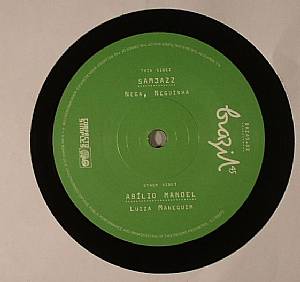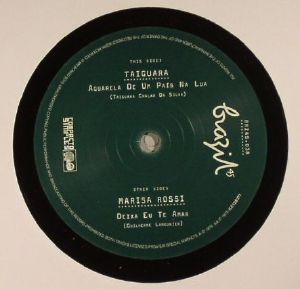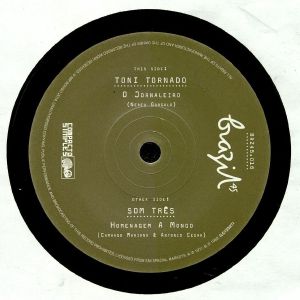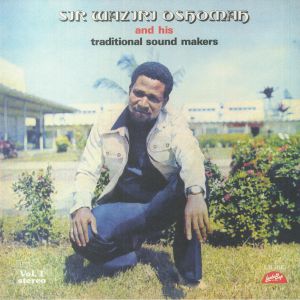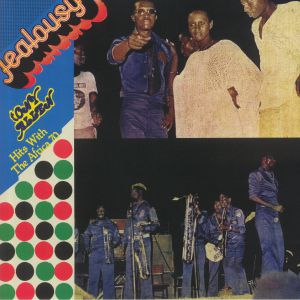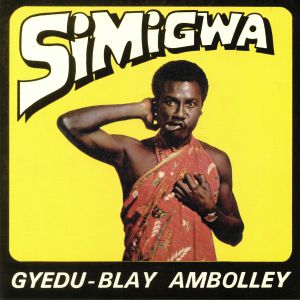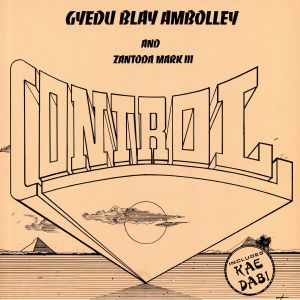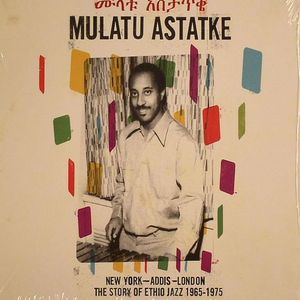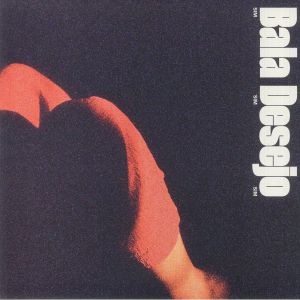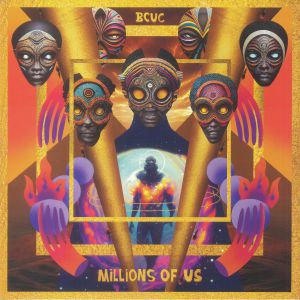Filter
Stock
Artist
Label
Release Title
Price
Tags
83
African
51
Afro Funk
51
Brazilian
23
Afrobeat
22
Brazilian Funk
22
MPB
17
Samba
14
African Disco
12
Highlife
11
Brazilian Jazz
10
Psychedelic Funk
9
Jazz Funk
8
Afro Jazz
6
Latin
5
Bossa Nova
4
Afro Rock
4
Brazilian Disco
4
Psychedelic Rock
3
Arabic
3
Disco Funk
3
Ethiopian Jazz
3
Latin Funk
2
Afro House
2
Cumbia
2
Psychedelic Disco
2
Psychedelic Soul
2
Soukous
1
Afro Cuban
1
Balearic Disco
1
Bubblegum
Back catalogue: Funk
Juno's full catalogue of Funk
Singles
in stock $12.58
Samba (limited 7")
Cat: AFRO45 001. Rel: 14 Apr 22
Review: Mr Bongo kickstarts a new Afro 45s series with serious intention; all-girl troupe from Guinea Amazones De Guinee take the lead with a live recording from Paris, 1983. Taken from their Au Coeur De Paris album, it's the perfect example of a live recording with the balance of musicianship and crowd participation precision tuned. Flip for the previously rare 1980 recording by Ivory Coast's Moussa Doumbia whose smoky vocals and JB-level shrieks hit hard over a clam-tight Afrofunk rhythm. What a way to start a new series.
… Read more in stock $11.17
Review: Legendary Brazilian jazz-funk trio Azymuth drop their latest record 'Arabuta', pointing themselves in a new cardinal direction in sound. The limited 7" brings two new mix version of their recently released 'Arabuta' to the fold, both by fellow producer and Azymuth collaborator Daniel Maunick. Part-dancefloor, part-dub, both versions bring preservative tones, fully circling the resinous Brazilwood tree after which the track is named. The Tupi Guarani word for the endangered tree fuses with deft unperturbed jazz licks, despite the sense of urgency in saving the species, underscoring Azymuth's fusion of timeless Brazilian jazz-funk and cosmic futurism. In more ways than one, this record serves as a symbol of both the value and fragility of Brazil's natural beauty.
… Read more in stock $19.56
Tessassategn Eko (limited 7")
Cat: AFR 45016. Rel: 14 Jun 16
Review: Afro 45's / Mr Bongo show no signs of stopping their tireless run of form and, 7" after 7", they just keep on producing the goods. There's yet more '70s goodness with this new little scorcher: the A-side is 1973's "Tessassategn Eko" by Bahta Gebre Hiwot, a pensive Ethiopian pop hit for all sorts of music fans to enjoy, but "Ayalqem Tedqem" by Alemayehu Eshete on the B-side is where it's at... just listen to that bass and you'll instantly recognize this wonderful little cover.
… Read more in stock $12.58
Review: For the latest release on their on-point Brasil 45s sub-label, Mr Bongo takes a trip back to 1977, and the early days of legendary fusion outfit Banda Black Rio. Both the cuts here are taken from the band's brilliant debut album, Maria Fumaca, and see them fusing Brasilian samba and jazz sounds with the righteous, dancefloor-friendly grooves of funk and disco. "Maria Fumaca" itself is a deliciously sunny and sweaty affair, with punchy horns, eyes-closed guitar solos and jazz-funk electic piano lines rising above a carnival-ready samba-funk groove. The U.S funk influence comes to the fore more on flipside "Mr Funky Samba", which sounds like Azymuth jamming with members of the T.K Disco, Philadelphia International and Salsoul house bands. Yep, it's that good.
… Read more in stock $8.84
Review: Brazilian electronics are back in vogue, and Tony Bizzaro might have just snaffled up said new wave's crown. All the way from 1976 comes 'Que Se Faz Da Vida', a strutting, suave, emotionally cool EP of only the most DJ-able and collected soul-funk. This reissue is, bizarrely, Bizarro's first ever.
… Read more in stock $10.05
Money Is The Root Of Evil (translucent orange vinyl 7")
Cat: ES 75LPC1. Rel: 17 Nov 22
Review: Dan Boadi left his native Ghana to take his highlife sound to American audiences after he had his 1967 breakout debut 'Abrabo'. That was a regional hit and soon after came this tune which was recorded at Paul Serrano's studio in Chicago. It showcased the real breadth and depth of his sound as it called upon reggae, acrobat, halide and funk to demand your ear with a chugging drum groove. Add in the colourful orchestration that makes the tune soar and a you have a record that is a true musical melting pot that stood Boadi pat in his new home of the Windy City.
… Read moreIntérprete: Mukatsuku Records Chart, Afro Beat Foundation
in stock $9.78
Review: German-Ghanaian group the Polyversal Souls have previously collaborated with a number of bands and solo artists from West Africa, so this hook-up with Northern Ghanaian outfit the Bolga All Stars - a collective made up of leading local kologo and frafra-gospel singers and musicians - should not come as much of a surprise. Separated into two parts for the seven-inch release, the track blends the Polyversal Souls' lolloping, late '60s style Afro-funk grooves - complete with fuzzy, period style production - and sharp horn section with glistening guitars, snaking solos and fine vocals from the Bolga All Stars. It's one of the Polyversal Souls' finest releases yet, and that's saying something.
… Read more in stock $10.05
Review: We'll never tire of the incredible Brazil45 series on Mr Bongo, which has provided an authoritative window into the rich history of 60s and 70s grooves from South America. Here's a missing joint from the series which took some time to come to fruition - a split release featuring Brazilian Boys on the A side and Rubinho E Mauro Assumpcao on the B. 'Super Herois' is an obscure slice of off-kilter, psych tinged funk from 1975 that has the kind of individual sound which could find favour with a lot of different DJs. 'Tudo Ai' has a more recognisable samba shuffle, but much like the A side there's a subtle twist in the sound which leans towards blues rock and jazz, locking down on the rhythm and creating a low-key party starter in its own unique way.
… Read moreIntérprete: Juno Recommends International
in stock $11.17
Quem Vem La (7")
Cat: COS 1087. Rel: 11 Jan 16
in stock $9.78
Review: Late 70s funk fusion from Tunisia: capturing the moment leading Tunis bands Dalton and Marhaba Band joined forces for some legendary disco fusion. "Alech" ignites with a Doobie Brothers style shiny guitar, big slap bass and soaring synth work while "Hanen" is a little more introspective and soulful with its honeyed harmonies and cascading chord sequence. Complete with instrumentals.
… Read more in stock $19.84
in stock $12.58
in stock $13.13
Black Soul Brothers (7")
Cat: BRZ45 05. Rel: 25 Apr 14
in stock $12.58
in stock $10.91
Review: Mr Bongo's gold-standard Brazil-45 series turns up more irresistible musical goodness here with steamy underground bubbler 'Quero Ver Voce Sambar'. This is thought to be the only ever recording by Homero Franca and it came originally on a 7" in 1976. It's warm, soulful, quite deep for Latin music and has great vocals. On the flipside is the more fiery Silvinha tune 'Mas Nao Deixe De Ir' with the raw vocals and big horns all making for a great call and response chorus with soulful samba sounds to spare.
… Read more in stock $12.58
in stock $12.58
Cat: BRZ 45089. Rel: 20 Jul 21
Review: Mr Bongo's essential Brazil 45s series notches up release number 89 via a blast of heavy dancefloor pressure that touches on both Brazilian funk and samba-rock. On the A-side you'll find Golden Boys' 1975 gem 'Segura Na Cintura Dela (O Gaviao)', an irresistible slab of full-throttle, orchestra-sporting, Hammond-heavy samba-funk marked out by strong group vocals and some superb musical arrangements. Over on the flip you'll find another classic from the same producer (Milton Miranda), Silvio Cesar's 1971 carnival masterpiece 'Beco Sem Saida' - an infectious excursion that found fame in the 2000s when Drumagick sampled it on 'Sambarock'.
… Read moreIntérprete: Fabietto Delgado (Ankle Release)
in stock $12.58
Intérprete: I Love Disco!, Juno Recommends International
in stock $12.58
Review: Mr Bongo's authoritative Brazilian 7" series continues apace with this delightful gem, featuring the magical talents of Guto on the A-side and Tony Nunes on the flip. Guto's 'Transito Livre' is a sweet slice of MPB (musica popular brasileira) which switches time signatures with flair from verse to chorus. Tony Nunes turns the heat up with 'Por Favor', a 1973 cut which sounds like it could jump right off the turntable with its fiery, funky urgency. Another essential purchase for all those who love hidden nuggets from Brazil's abundant musical history.
… Read moreIntérprete: Voodoocuts
in stock $12.58
Luanda (Record Store Day RSD 2022) (limited 7")
Cat: MBX 166. Rel: 30 Apr 22
in stock $8.93
! low stock $12.58
Cat: BRZ 45081. Rel: 16 Oct 20
Review: Mr Bongo's excellent Brazil.45 series digs deeper into the legacy of Jorge Ben, one of Brazil's most famous musical exports and an enduring samba king. Opening up is 'Ma Ma Ma Ma Mae (A Lingua Dos Anjos)' which was originally on his 1980 album Alo Alo, Como Vai? It's a modern sound, with disco inflections and big wind sections, but also some trademark Ben playfulness in the lyrics which speak of flying saucers and angels. O the flip, things slow down and get more steamy and sensuous on 'Dona Culpa' from his Cauby! Cauby!' album of the same year. Two sides, two styles, one irrepressible artist.
… Read more in stock $12.58
in stock $11.17
Morro Do Barraco Sem Agua (reissue) (limited green vinyl 7")
Cat: MRB 7181G. Rel: 09 Apr 21
Intérprete: JKriv (Razor-N-Tape), Juno Recommends International
in stock $17.88
Festa Do Balamba (limited 7")
Cat: BRZ 45 027. Rel: 19 Aug 15
in stock $12.29
in stock $13.13
in stock $37.74
Deixa A Tristeza (7")
Cat: BRZ45 076. Rel: 07 Feb 20
Review: After delivering some killer reissues over the last few years, Mr Bongo's brilliant Brazil 45s series has reached "buy on sight" status. It goes without saying that the label's latest double-header of hard-to-find Brazilian gems is white hot. A-side Neno Exporta Som's impossible-to-find 1971 gem "Deixa A Tristeza", a wild and life-affirming fusion of samba and funk full of fuzzy sax solos, glassy-eyed vocals and heavyweight grooves. Over on the flip you'll find another killer cut from '71: "Sumauma" by MPB star Agnaldo Rayol. Blessed with a great groove and incredible arrangement, it sounds like a Brazilian take on the sort of over-the-top songs used to open James Bond movies in the 1970s (albeit with a bit of samba sunshine thrown in).
… Read more in stock $10.91
in stock $13.40
Review: Insanely funky business from Senegal's famous Orchestra Baobab (who are still touring and toiling 40 years later), "Kelen Ati Leen" is a really sweaty, heavy slab of funk that stares west for inspiration and a mild psychedelic Hendrixian sheen. "Souleymane", released three years after the A-side in 1978, takes more of a Latin influence as the horns get steamy over a rigid highlife spine to create a detailed and very physical groove.
… Read more in stock $12.29
Kpede Do Gbe Houenou (7")
Cat: AJX 575S. Rel: 21 Sep 21
Review: Benin funk supergroup Orchestre Poly-Rythmo de Cotonou have an essential discography that takes in some of the most definitive afro-funk sounds you can hear. The Acid Jazz label serves up a couple of such betters here with 'Kpede Do Gbe Houenou' layering up the driving grooves, killer horns and wild keys into something intoxicating. Less intense but just as good, 'Ma Wa Mon Nou Mi O' brings the guitar work to the fore, with plucked and funky riffs underneath the imploring vocal work that's up top. Both tunes have been restored and remastered.
… Read more in stock $12.29
Review: Acid Jazz Records' has got a licensing agreement with legendary Benin label Albarika Store that is seeing them put out some of the best music to have ever come from West Africa. Benin's almighty Orchestre Poly-Rythmo de Cotonou Dahomey made plenty of it. This latest 45 is another stunner with plenty of raw screams, wails and grunts all adding extra life and vitality to the already trilling guitars and bustling drum rhythms. Add in heavy percussion and you have a real heavy Afro psych-funk tune. The flip is more deep and soulful, and just as good for different reasons.
… Read moreIntérprete: Voodoocuts, Juno Recommends Funk, Galletas Calientes, Afro Beat Foundation, DJ Kobayashi
in stock $12.29
Review: Following persistent requests, Mr Bongo has finally relented and dedicated an edition of their popular Brazil 45s series to Orlandivo Honorio de Souza, a composer, singer and percussionist whose 1977 album Oelandivo remains high on my collectors' wants-lists. Wisely, their A-side pick is 'Onde Anda O Meu Amore', a cosmic and spacey fusion of samba-soul and jazz-funk rich in ethereal flute lines and intergalactic keys. This time round it comes backed by the equally as impressive 'Gueri Gueri', an insatiable samba-rock number wrapped in heady accordion, jangly acoustic guitar and punchy horn sounds.
… Read moreIntérprete: Voodoocuts, Afro Beat Foundation
in stock $12.58
Review: Mr Bongo's Brazil45 series continues apace with this 95th entry, which carries two separate sides to keep any Latin-minded DJ very happy indeed. 'Mar Afunda' is a dancefloor delight from Os Novos Crioulos which originally came out on the group's self-titled album on Pirata in 1976. It's shuffling and sublime, sure to get a plethora of ID requests and shimmying moves from the people with their ears tuned in. On the flip we get Supersom TA's 'Brasileira Roxa', a sunny slice of samba fun which originally came out in 1972 and features more cuica flexing than you could ever dream of.
… Read more in stock $12.58
Review: Samba flavours do not come more authentic than this. The sixth in Mr Bongo's Brazil 45 series, here they unearth two foundation pieces from Rio collective Os Origianais Do Samba. Forming in 60s Rio, they're still highly active today and have a discography peppered with Brazilian gold. This 45 does well to showcase their breadth... "La Vem Salgueiro" is quintessential samba. Heavy rhythm, punctuated vocals and a dynamic that leaps from bold and delicate in a flash, it charms you instantly. "Tenha Fe" has a softer soul as it strums and sways and more of a folky sensation, tight harmonies and alluring naked instrumentation.
… Read more in stock $12.58
Review: For the latest volume in their essential "Brazil 45" series of seven-inch singles, Brighton-based Mr Bongo has decided to offer up a fresh pressing of MPB star Renata Lu's superb 1971 single "Faz Tanto Tempo". You'll find the title track, a heavyweight fusion of US style soul and funk with added Latin percussion and a touch of easy listening sassiness, on side A, with original B-side "Sambaloo" on the flip. This features Lu singing over a hybrid samba/boogaloo backing track rich in jaunty bass, rasping horns and jazzy electric piano riffs. It's arguably every bit as alluring as the A-side.
… Read moreIntérprete: Mukatsuku Records Chart, Ju & juju
in stock $11.17
Review: Ricardo Bomba was not only a studio owner, engineer, pianist and composer, but so too was he an accomplished amateur skateboarder. He lay down these previously unreleased, sun soaked Brazilian tunes in 1978 after years as bandleader with the one and only Jorge Ben's live show. The master tapes were said to have been binned during a heavy studio clear out but the man himself kept a tape copy that has been remastered for this special 7". Mariana Couto provides the angelic vocals while the music all trills with joy and happiness.
… Read moreIntérprete: Juno Recommends Funk, Red Greg
in stock $13.13
Cat: BRZ 4504. Rel: 27 Mar 14
in stock $11.17
in stock $12.58
Aquarela De Um Pais Na Lua (limited 7")
Cat: BRZ 45038. Rel: 25 Jan 16
Review: Mr Bongo's Brazil 45s series continues its consistently rich vein of form with two more beautifully contrasting - and previously difficult to track down - Brazilian soul jazz fusions from the 70s. Side A is inhabited by one of the era's most interesting individuals. Infamously censored and eventually exiled, Taiguara's chaotic flute, guitar and piano arrangement is a tight weave of melodies, counter melodies and start dynamics. Flip for the classically soul-oriented "Deixa Eu Te Amar" will bright horns, brash drums and a bold vocal from Marisa Rossi. Pow.
… Read moreIntérprete: Afro Beat Foundation, The Expansions
in stock $12.58
Review: Rich gutsy soul from a man who's regularly described as Brazil's James Brown, "O Journalerio" is a blueprint funk jam. Released in 1971 (on his hyper-rare album BR-3) it's all about the orchestrated swing, bluesy groove and Hammond licks so lavish you need to towel on every listen. Flip for Som Tres... An off-shoot of the Sambalanco Trio, it's the sound of Cesar Camargo Mariano controlling a restrained rolling slice of filmic instrumental funk where horns, keys and drums gather momentum with big band drama. Neither have been released on 45" before, making this all the more special.
… Read more in stock $12.29
Álbumes
in stock $43.59
Review: The magnificent Luaka Bop label has been showcasing the work of Alhaji Waziri Oshomah - a master of Afro sounds and rhythms that cut deep - for a while now across several albums and compilations. He hails from Edo State in southern Nigeria and is known for holding sermons of the religious as well as musical sort. After various volumes of work and the superb World Spirituality Classics 3: The Muslim Highlife Of Alhaji Waziri Oshomah record comes this new series of gems that show off his unique take on international rhythms across four long, ever evolving and always engaging grooves.
… Read moreIntérprete: AfroBase (Radio Chart)
in stock $30.75
in stock $28.51
Review: 1975's "Simigwa" album not only launched the career of Afro-funk fusionist and eventual Highlife great Gyedu Blay Ambolley, but also inspired a Ghanaian dance craze. The album was co-produced by another Highlife great, Ebo Taylor, and has long been exceptionally hard to find on vinyl. For this official vinyl reissue on Mr Bongo, Ambolley's landmark set has been fully re-mastered for the very first time. It sounds spectacular, with great clarity on the ear-catching brass solos, serious weight to the bass and superb stereo separation. Highlights include - but certainly aren't limited to - the Afro-blues brilliance of "Toffie", the jaunty dancefloor fuzziness of "This Hustling World" and the heavyweight swing of ear-catching opener "Kwaakwaa".
… Read more in stock $24.87
Intérprete: JimmyTheTwin, AfroBase (Radio Chart)
in stock $24.87
Cat: STRUT 051LP. Rel: 03 Nov 09
in stock $31.86
Review: It's no mean feat to win awards with your debut album, but Bala Desejo did just that when they scored big at the Latin Grammys. As soon as you hit play on Sim Sim Sim you'll understand why, as the Rio de Janeiro band demonstrate their canny blend of 60s tropicalia, 70s psychedelia and MPB. It's pure pleasure music, full of wistful escapism and aching beauty, and in drawing so naturally on the best of Brazilian music culture through the ages, they've made something truly woven into the fabric of their home country. Spearheading a new wave of music and art from Rio de Janeiro, Bala Desejo have everything you could possibly want from a new Brazilian project, and more besides.
… Read moreIntérprete: Charlie bucket/ dancing in space
in stock $24.04
Millions Of Us (LP)
Cat: OTCRLP 018. Rel: 01 Jun 23
Review: BCUC aka. Bantu Continua Uhuru Consciousness are a South African band working in a highly specific niche: political psychedelic music with an African twist. Six long, energetic opuses hear the collective band intone in multiple languages, embracing Babel, while paying due homage to the anti-apartheid movement, as well as indigenous peoples, through many an ecstatic, multifaceted, hedonic trance.
… Read more in stock $15.94

 USD
USD






